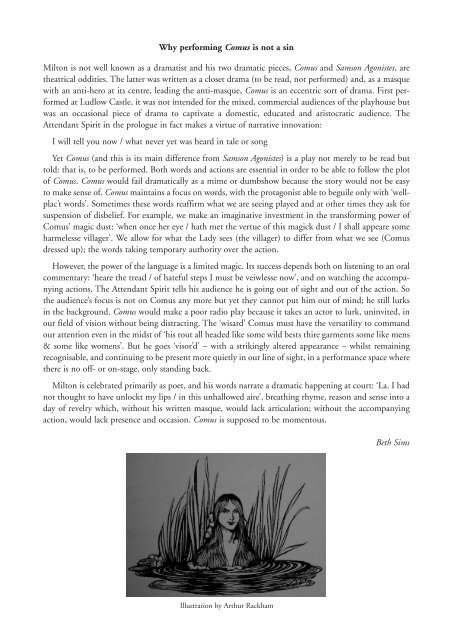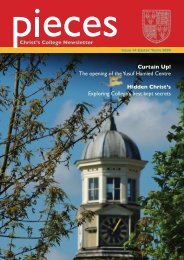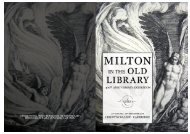here - Christ's College - University of Cambridge
here - Christ's College - University of Cambridge
here - Christ's College - University of Cambridge
You also want an ePaper? Increase the reach of your titles
YUMPU automatically turns print PDFs into web optimized ePapers that Google loves.
Why performing Comus is not a sin<br />
Milton is not well known as a dramatist and his two dramatic pieces, Comus and Samson Agonistes, are<br />
theatrical oddities. The latter was written as a closet drama (to be read, not performed) and, as a masque<br />
with an anti-hero at its centre, leading the anti-masque, Comus is an eccentric sort <strong>of</strong> drama. First performed<br />
at Ludlow Castle, it was not intended for the mixed, commercial audiences <strong>of</strong> the playhouse but<br />
was an occasional piece <strong>of</strong> drama to captivate a domestic, educated and aristocratic audience. The<br />
Attendant Spirit in the prologue in fact makes a virtue <strong>of</strong> narrative innovation:<br />
I will tell you now / what never yet was heard in tale or song<br />
Yet Comus (and this is its main difference from Samson Agonistes) is a play not merely to be read but<br />
told: that is, to be performed. Both words and actions are essential in order to be able to follow the plot<br />
<strong>of</strong> Comus. Comus would fail dramatically as a mime or dumbshow because the story would not be easy<br />
to make sense <strong>of</strong>. Comus maintains a focus on words, with the protagonist able to beguile only with ‘wellplac’t<br />
words’. Sometimes these words reaffirm what we are seeing played and at other times they ask for<br />
suspension <strong>of</strong> disbelief. For example, we make an imaginative investment in the transforming power <strong>of</strong><br />
Comus’ magic dust: ‘when once her eye / hath met the vertue <strong>of</strong> this magick dust / I shall appeare some<br />
harmelesse villager’. We allow for what the Lady sees (the villager) to differ from what we see (Comus<br />
dressed up); the words taking temporary authority over the action.<br />
However, the power <strong>of</strong> the language is a limited magic. Its success depends both on listening to an oral<br />
commentary: ‘heare the tread / <strong>of</strong> hateful steps I must be veiwlesse now’, and on watching the accompanying<br />
actions. The Attendant Spirit tells his audience he is going out <strong>of</strong> sight and out <strong>of</strong> the action. So<br />
the audience’s focus is not on Comus any more but yet they cannot put him out <strong>of</strong> mind; he still lurks<br />
in the background. Comus would make a poor radio play because it takes an actor to lurk, uninvited, in<br />
our field <strong>of</strong> vision without being distracting. The ‘wisard’ Comus must have the versatility to command<br />
our attention even in the midst <strong>of</strong> ‘his rout all headed like some wild bests thire garments some like mens<br />
& some like womens’. But he goes ‘visor’d’ – with a strikingly altered appearance – whilst remaining<br />
recognisable, and continuing to be present more quietly in our line <strong>of</strong> sight, in a performance space w<strong>here</strong><br />
t<strong>here</strong> is no <strong>of</strong>f- or on-stage, only standing back.<br />
Milton is celebrated primarily as poet, and his words narrate a dramatic happening at court: ‘La. I had<br />
not thought to have unlockt my lips / in this unhallowed aire’, breathing rhyme, reason and sense into a<br />
day <strong>of</strong> revelry which, without his written masque, would lack articulation; without the accompanying<br />
action, would lack presence and occasion. Comus is supposed to be momentous.<br />
Illustration by Arthur Rackham<br />
Beth Sims





